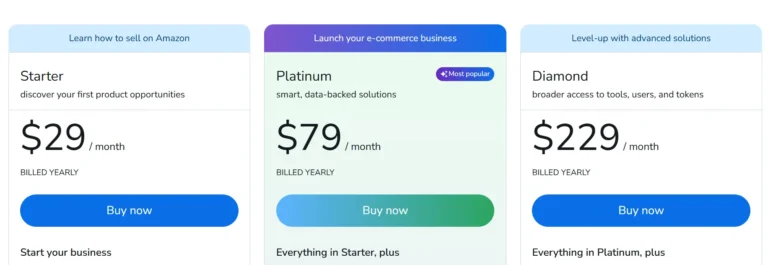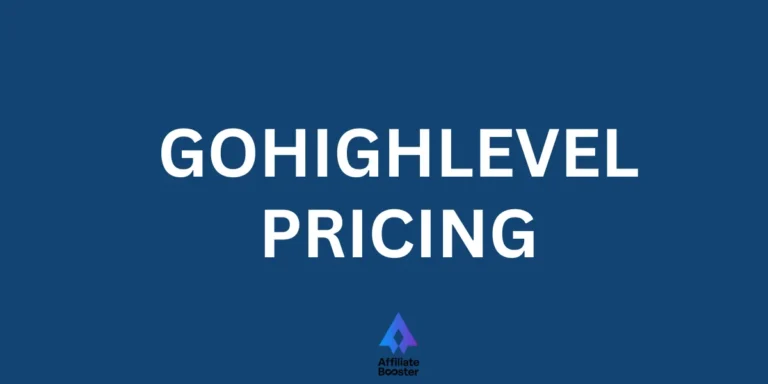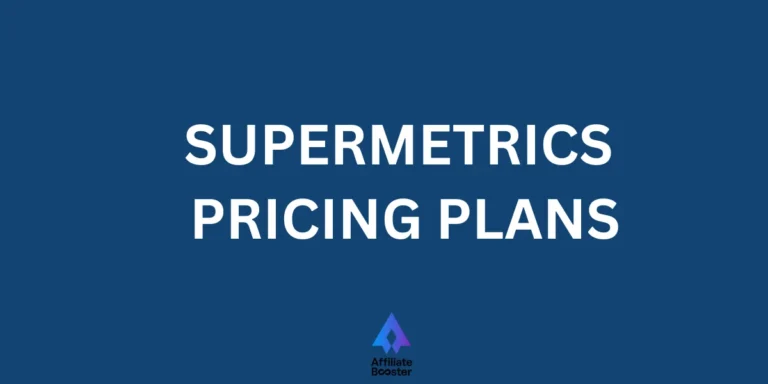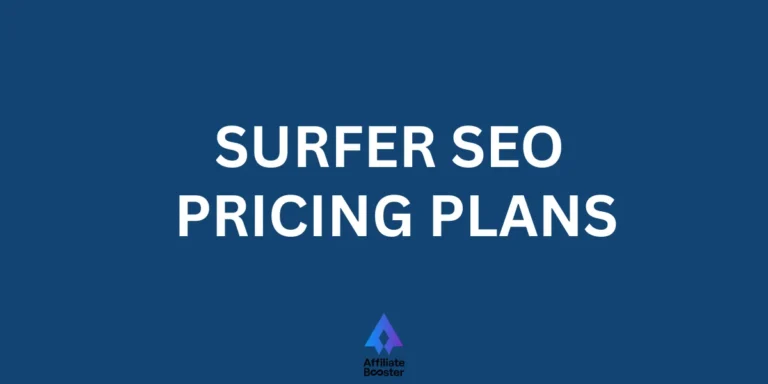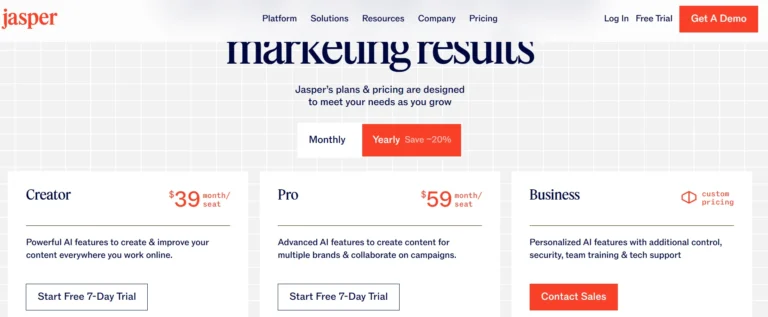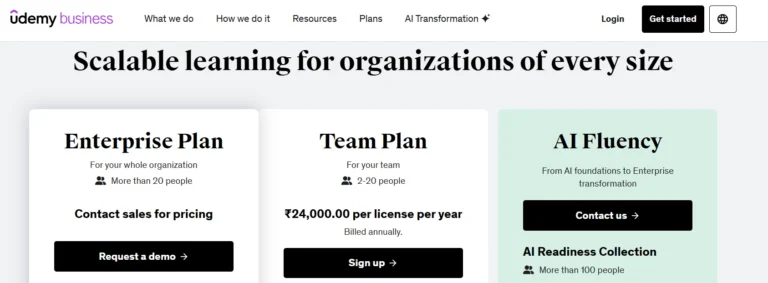I’ve spent a lot of time exploring online learning platforms and noticed how education has shifted from traditional classrooms to online courses.
Coursera is one of the top platforms in this change, offering courses, certificates, and degrees from leading universities and companies.
A common question people ask is, “How much does Coursera cost, and is it worth it?” Coursera typically offers free courses, paid subscriptions, and full degree programs.
This guide breaks down all of Coursera’s pricing options, so you’ll know exactly what you’ll pay for, whether you’re interested in free courses, certificates, career credentials, or complete online degrees from top universities.
Quick Overview of Coursera
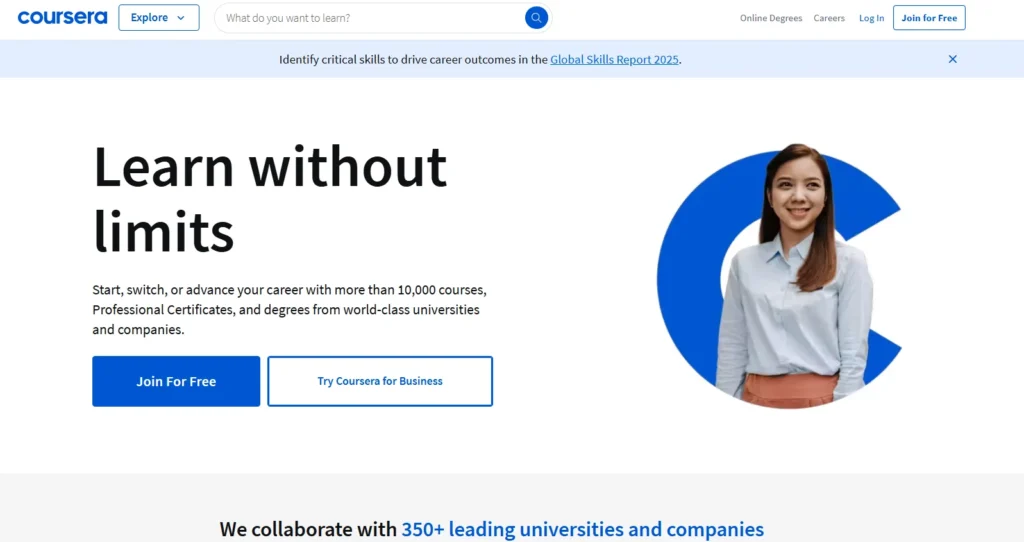
Coursera is a top online learning platform that makes quality education available to millions of people around the world.
Founded in 2012 by Stanford professors Andrew Ng and Daphne Koller, it works with over 300 leading universities, such as Stanford, Yale, and the University of London, as well as major companies like Google, IBM, and Meta.
Coursera offers a wide variety of courses, certificates, and degrees, making it a great option for students, professionals, or anyone looking to learn new skills, improve their career, or explore new topics.
Checkout👉Coursera Review: Best Platform to Improve Your Skills?
Coursera Pricing Plans as of 2026
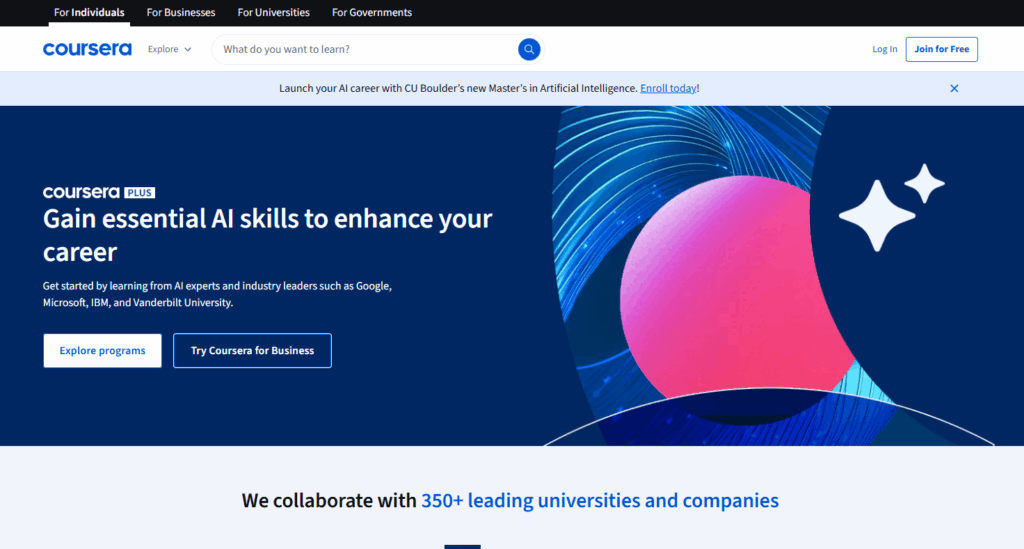
Coursera provides various learning options, from free courses to full degrees. The cost depends on what you’re looking for, whether it's a single course, a professional certificate, or a degree.
Here’s a simple breakdown of Coursera’s pricing in 2026:
1. Free Courses (Audit Option)
Coursera allows you to take many courses for free through the “audit” option. This gives you access to video lectures, reading materials, and some practice exercises without any cost.
However, you won’t receive graded assignments, quizzes, or a certificate unless you pay. The audit option is a great way to explore a subject or learn something new without any financial commitment.
- Cost: $0
- What You Get: Video lectures, reading materials, and practice exercises.
- Best For: People exploring new topics or learning for personal growth.
- Tip: Check the course page to see if the audit option is available. Some newer courses may not offer it.
2. Individual Courses
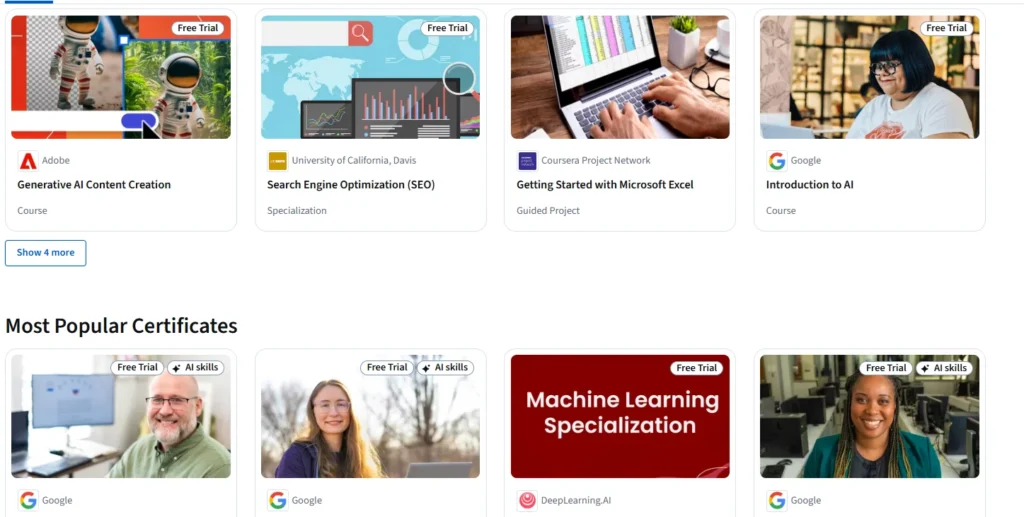
If you want graded assignments, feedback from peers, and a certificate, you’ll need to pay for an individual course. These courses are self-paced, allowing you to learn at your own speed and finish according to your schedule.
With these courses, you get full access to all the materials, and when you complete the course, you receive a certificate that you can add to your resume or LinkedIn profile.
- Cost: $29–$99 per course (one-time payment).
- What You Get: Full access to the course content, graded assignments, and a certificate you can share.
- Best For: People looking to learn specific skills or earn a credential for their career.
- Tip: Be sure to check for discounts on the course page, especially during holiday seasons when Coursera often offers deals.
3. Guided Projects
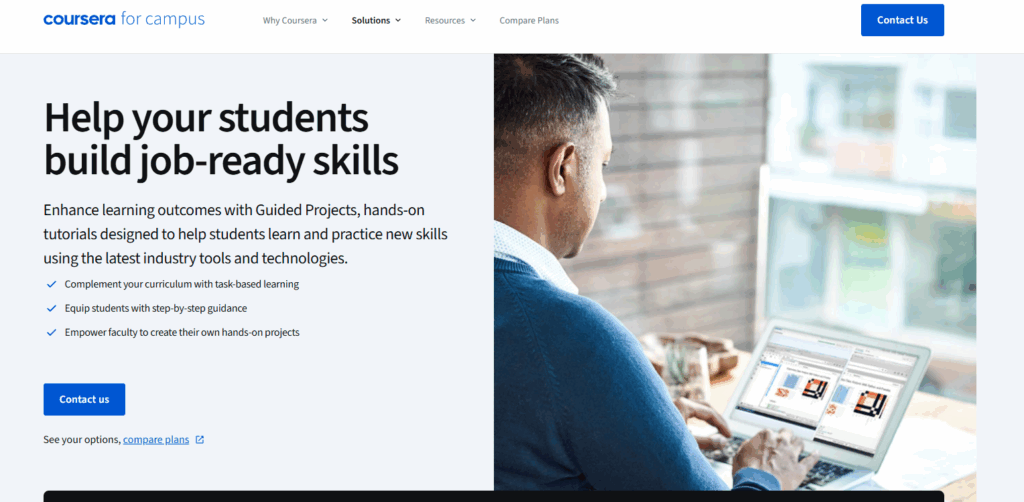
Guided Projects are short, hands-on courses where you focus on completing a specific project. These courses are designed to help you learn by doing.
For example, you might build a simple website or create a basic data analysis project. These projects usually take a couple of hours to complete, making them a great way to quickly pick up a new skill without a large time commitment.
- Cost: $9.99–$19.99 per project (one-time payment).
- What You Get: Step-by-step instructions, project tools, and a certificate upon completion.
- Best For: Beginners or professionals looking to quickly learn a new skill.
- Tip: These projects are affordable, but make sure the project fits your learning goals before you start.
4. Specializations
Specializations are a set of 3–5 courses centered around a specific topic, like digital marketing or Python programming.
These programs are designed to help you gain deeper knowledge and practical skills in that area. At the end, you complete a capstone project that ties everything together. Specializations are great for building expertise in a subject.
- Cost: $39–$79 per month until you finish (usually 3–6 months).
- What You Get: Multiple courses, hands-on projects, and a specialization certificate.
- Best For: Professionals looking to develop in-depth skills in a particular field.
- Tip: You can cancel at any time, but finishing faster will save you money on monthly payments.
5. Professional Certificates
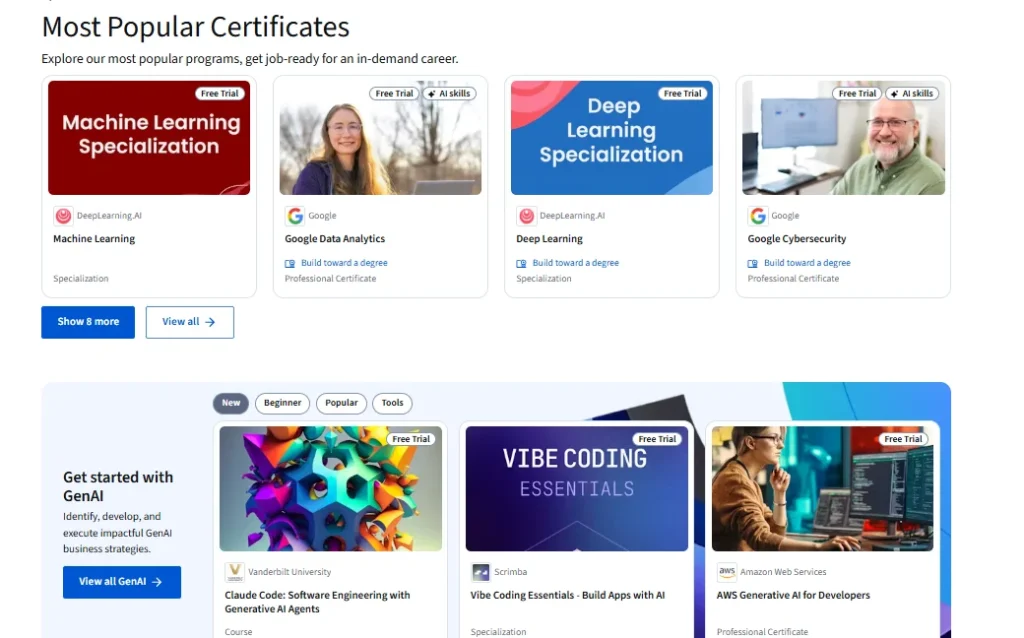
Professional Certificates are career-focused programs designed by companies like Google, IBM, and Meta. These programs teach practical, job-ready skills and often include hands-on projects that help you build a real-world portfolio.
For example, a Google UX Design certificate can help you gain valuable experience and create a portfolio that can boost your job search.
- Cost: $39–$99 per month (usually 3–6 months to complete).
- What You Get: Industry-specific training, real-world projects, and a certificate that employers recognize.
- Best For: Career changers or anyone looking to earn industry credentials.
- Tip: Make sure the certificate aligns with the skills required for jobs in your field before signing up.
6. Coursera Plus
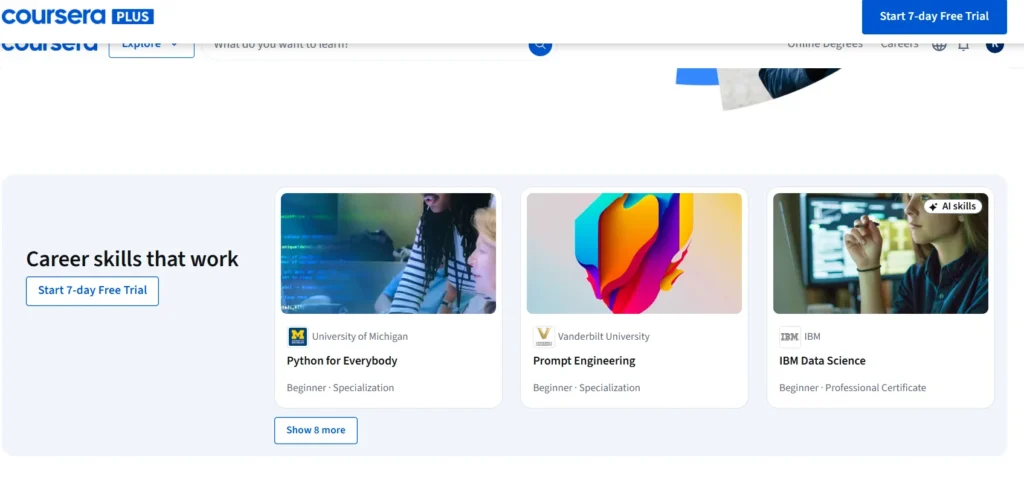
Coursera Plus is a subscription service that gives you unlimited access to over 7,000 courses, specializations, and professional certificates.
With this plan, you can take as many courses as you want without worrying about extra costs for each one. This makes it ideal for learners who want to explore multiple topics or take several courses in one year.
Whether you're interested in subjects like data science, business leadership, or photography, Coursera Plus allows you to dive into a wide range of courses at no additional charge beyond the subscription fee.
- Cost: $59 per month or $399 per year (about $33/month). In 2026, there’s a 40% discount on the annual plan, reducing it to $240/year (about $20/month).
- What You Get: Unlimited access to most courses, including certificates, and a 7-day free trial to try it out.
- Best For: Those who plan to take multiple courses, explore different subjects, or want flexibility in their learning journey.
- Tip: The annual plan is a better deal if you plan to study for more than 4 months.
Check out the Latest Deals on Coursera Plus here👉Coursera Plus Discount: 40% Off + Free Trial
7. MasterTrack Certificates
MasterTrack Certificates are advanced programs designed to offer university-level courses and provide credits that can be applied toward a full degree.
These programs are a great option if you’re looking to gain specialized knowledge in a field and want to earn credits that might count towards a future degree. They provide the academic rigor of a traditional degree program, but you complete them online in a shorter timeframe.
MasterTrack Certificates can be a good choice for professionals aiming to advance their careers without committing to a full degree program right away.
- Cost: $2,000–$5,000 (one-time payment).
- What You Get: University-level courses, credits that may transfer to a full degree, and a certificate.
- Best For: Professionals who want to enhance their skills and credentials without pursuing a full degree.
- Tip: Before enrolling, confirm with the university whether the credits can be transferred to your desired degree program if you plan to continue your education later.
8. Online Degrees
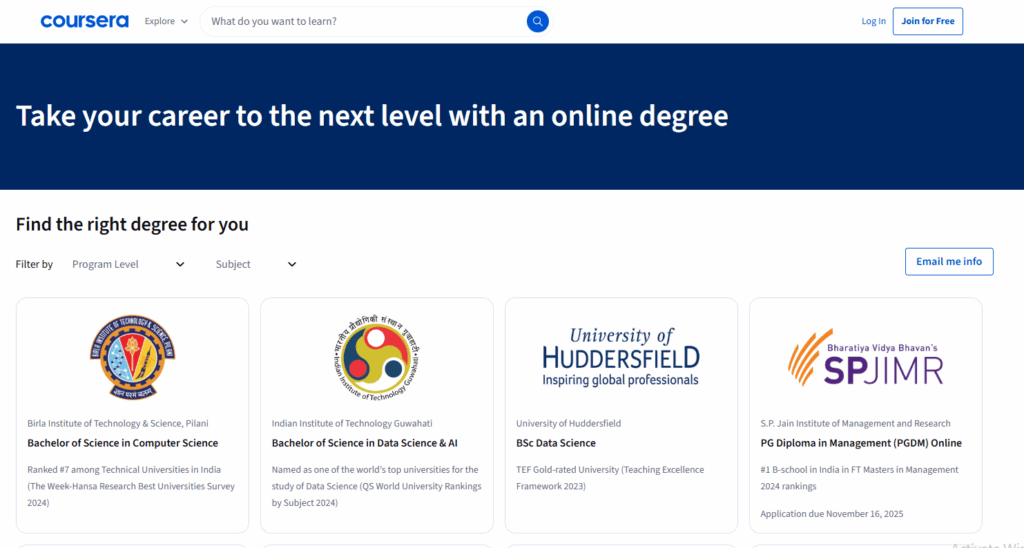
Coursera offers both bachelor’s and master’s degrees from well-known, accredited universities such as the University of London and the University of Illinois.
These degrees are fully accredited, meaning they hold the same value as degrees earned through traditional on-campus programs. The main difference is that you can study entirely online, which gives you the flexibility to learn at your own pace, from anywhere in the world.
This makes it a great option for busy professionals or students who need more flexibility with their studies. Earning a degree through Coursera can help improve your qualifications and open doors for career advancement, just like a traditional degree.
- Cost: $9,000–$50,000 total, depending on the program and university.
- What You Get: A fully accredited degree, the freedom to study at your own pace, and access to financial aid options.
- Best For: Students or professionals looking to earn a formal degree while maintaining flexibility in their schedule.
- Tip: If the tuition cost seems too high, be sure to apply for financial aid. Coursera and its partner universities often provide financial assistance to make these programs more affordable.
9. Coursera for Business
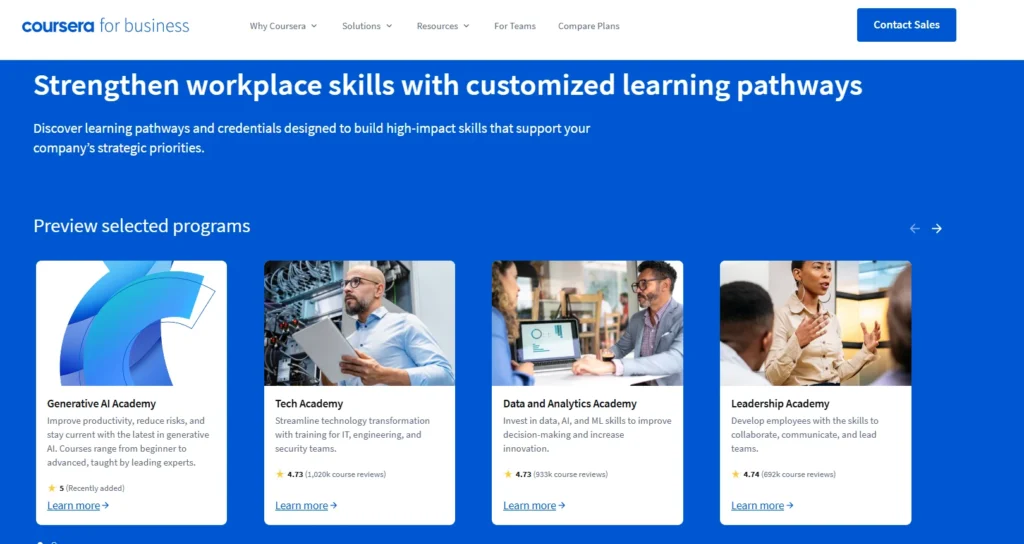
Coursera offers special plans for businesses called Team and Enterprise, designed to help companies train their employees.
These plans give organizations access to Coursera’s wide range of courses, allowing employees to upskill in various areas, such as technology, leadership, or specific industry skills.
The Team plan is a great option for small to medium-sized businesses, while the Enterprise plan is tailored for larger organizations with more customized needs. These plans also provide analytics and support to help businesses track employee progress and measure the impact of the training.
- Cost: $399 per user per year (Team plan); Enterprise plan has custom pricing.
- What You Get: Access to a wide range of courses for employees, detailed analytics, and dedicated support.
- Best For: Companies looking to upskill their teams, especially in areas like technology, leadership, or business management.
- Tip: Small businesses can start with the Team plan and upgrade to the Enterprise plan later as the company grows and its training needs become more specific.
10. Coursera for Universities
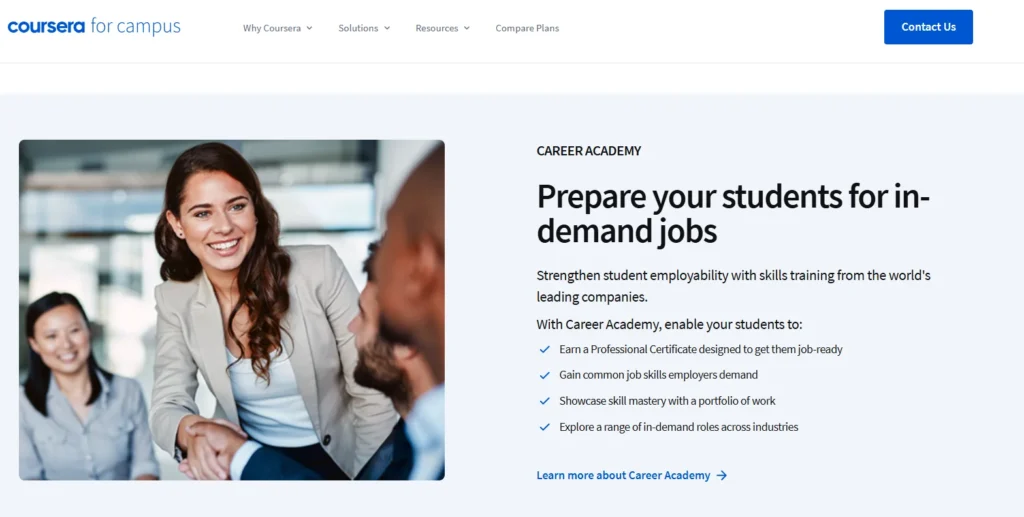
Coursera for Universities, or Coursera for Campus, helps universities integrate online learning, train faculty, and prepare students for careers. It offers flexible plans for different needs, from free access to credit-bearing programs. Here’s the breakdown:
1. Student Plan
- Cost: Free
- What You Get: Unlimited Guided Projects and one free course per year for each student. Students can learn at their own pace, with mobile access and support.
- Best For: Students who want to enhance their education with practical skills.
- Note: The free plan limits students to one free course per year, which doesn’t include a certificate.
2. Basic Plan
- Cost: Free, for up to 20,000 student licenses per university
- What You Get: Unlimited Guided Projects and one free course per year per student, along with basic plagiarism prevention and online support.
- Best For: Universities offering free access to many students without advanced features.
- Note: Good for schools on a budget, but lacks features like custom course creation.
3. Institution Plan
- Cost: Custom pricing
- What You Get: Unlimited Guided Projects, course enrollments, and tools for creating and managing credit-bearing programs. Features include proctoring, plagiarism detection, and skill analytics.
- Best For: Universities building online programs that offer credit or integrating Coursera into their curriculum.
- Note: Best for institutions offering full online degree programs. Contact Coursera for pricing details.
Additional Notes:
- Academic Integrity: Tools like plagiarism detection and secure exams help maintain academic quality.
- Financial Aid: Available for students who can’t afford paid courses.
- Regional Pricing: Prices vary by country, so check Coursera’s site for local rates.
11. Coursera for Government
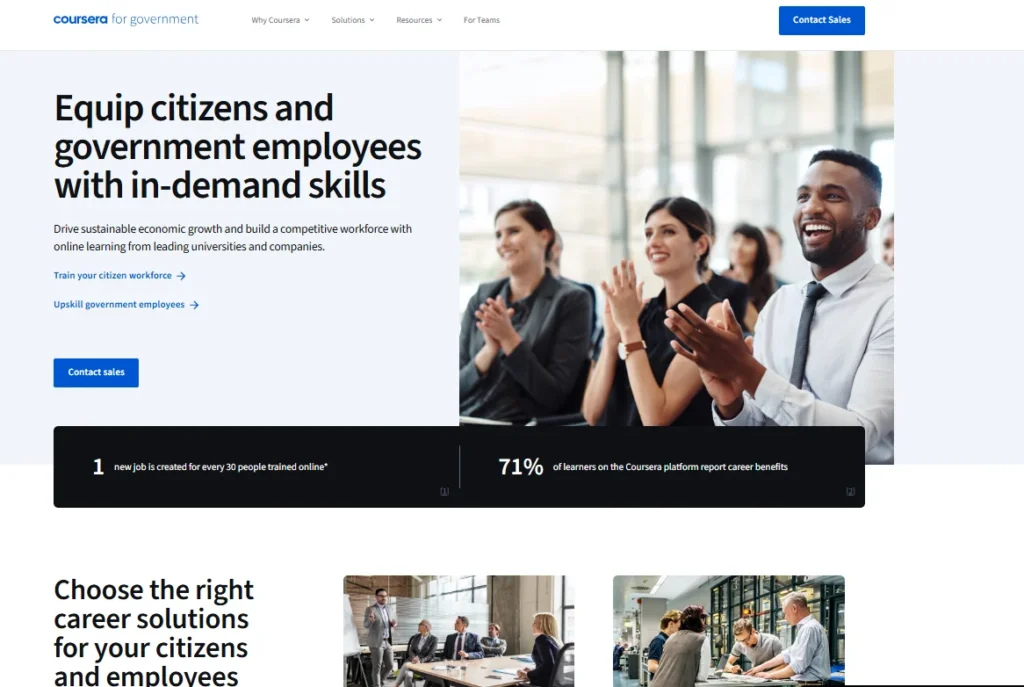
Coursera for Government helps agencies and organizations train employees and citizens in skills like data science, technology, and leadership.
The plans are designed to boost workforce development and economic growth, with pricing based on the size of the organization:
1. Coursera for Government Teams
- Cost: $399 per user per year (with a 25% nonprofit discount for 5–100 licenses)
- What You Get: Unlimited access to over 8,400 courses, 1,500+ Guided Projects, and 1,000+ Specializations. Includes Professional Certificates and analytics tools.
- Best For: Small to medium-sized government teams or agencies.
- Note: The cost can be high per user, but the value is great for professional development. Nonprofits get a discount.
2. Coursera for Government Enterprise
- Cost: Custom pricing (contact Coursera for a quote)
- What You Get: Includes everything in the Teams plan, plus advanced features like skill assessments, custom learning paths, and solutions support.
- Best For: Large agencies or national programs aiming to train a large workforce.
- Note: Ideal for large-scale programs, but pricing depends on your specific needs.
Additional Notes:
- Partnerships: Coursera partners with governments worldwide to offer training for groups like veterans or citizens.
- No Free Trial: Unlike Coursera Plus, Government plans don’t offer free trials, but the Teams plan has a 14-day money-back guarantee.
- Global Reach: Pricing adjusts by country, and courses are available in 54 languages.
Coursera Pricing in Different Countries
Coursera adjusts its prices depending on where you are to make learning more affordable and accessible.
For example, Coursera Plus costs around £47 per month in the UK or A$89 per month in Australia (roughly $59 USD). Degree programs and MasterTrack certificates have similar price ranges worldwide, but it’s always a good idea to check Coursera’s website for the most up-to-date prices in your local currency.
Discounts and Financial Aid
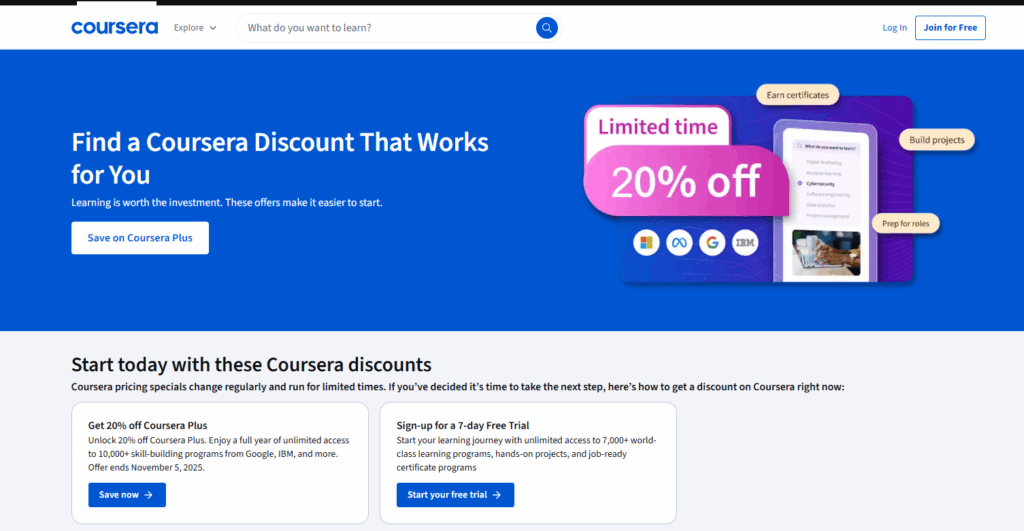
Coursera offers several ways to save on courses and subscriptions. Here are some options to consider:
- Discounts: Coursera offers a 20% discount on the Coursera Plus annual plan in 2026, reducing the price to $319.20 (from $399). Discounts on individual courses and specializations are also available at various times throughout the year.
- Free Trials: Coursera Plus includes a 7-day free trial, allowing you to explore courses without commitment. Some specializations also offer a 7-day free trial for the first month, so you can try them before making a full commitment.
- Financial Aid: If the cost of a course, specialization, or degree program is a concern, Coursera offers financial aid. You can apply by filling out a simple form explaining your financial need and learning goals. This can make higher-cost programs more affordable.
- Student Discounts: If you have a .edu email address, you may qualify for free or discounted courses through Coursera for Campus, a program designed for students. This gives students access to a wide range of learning opportunities at a reduced price or even for free.
These options help make Coursera more accessible, especially if you're looking to learn on a budget or are just starting out.
Is Coursera Worth It?
Yes, Coursera is worth the cost if it fits your goals. For personal growth, free audit courses offer quality content from top universities like Yale.
Career-focused learners can benefit from Professional Certificates, like Google’s Data Analytics, for $49/month. Coursera Plus, at $240/year, gives unlimited access to over 7,000 courses, making it great for exploring various topics.
Degrees, costing $9,000 to $50,000, are perfect for those seeking formal education with financial aid available.
While Coursera can have some outdated content and slow support, its flexibility and credibility make it a valuable platform. Try a free course or the 7-day Coursera Plus trial to see if it’s right for you.
Quicklinks:
- Udemy Pricing Plans: Is It Worth The Cost?
- Semrush Pricing: Which Semrush Plan is Best?
- Helium 10 Pricing & Plans: Full Cost Breakdown
- Jasper AI Pricing Plans– Which Plan Is Worth Buying?
- Pageoptimizer Pro Pricing Plans: How Much Does POP Cost?
- Coursera Plus Discount: 40% Off + Free Trial
- Coursera Review: Best Platform to Improve Your Skills?
- WP Rocket Review
Final Thoughts on Coursera Pricing Plans 2026
Coursera offers a wide range of learning options for different needs, whether you're looking to gain new skills, earn a certificate, or pursue a degree.
With flexible pricing and access to courses from top universities and companies, it can be a valuable tool for personal growth and career development.
However, it’s important to choose the right plan that fits your goals and budget. If you're unsure, starting with a free course or a trial can help you decide. Overall, Coursera provides quality education with a variety of options to suit different learning paths.
